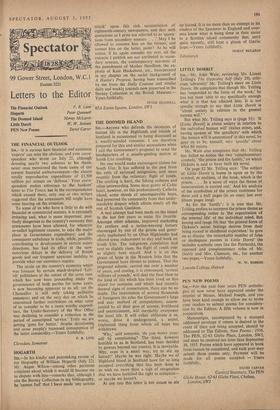THE DOOMED ISLAND Sta,—Anyone who defends the decencies of human
life in the Highlands and islands of Scotland is accustomed to being dismissed as a woolly-minded romantic. I am therefore prepared for this and similar accusations when I call the Government's proposal to erect the headquarters of a missile-guiding station at South Uist revolting.
No one would make extravagant claims for South Uist. It has suffered in the past from the evils of enforced emigration, and more recently from the voluntary flight of youth. The crofting is hard, the fishing arduous and often unrewarding. Some deep gaiety of Celtic heart, however, on this predominantly Catholic island, some shreds of unconquerable hope, had preserved the community from that under- standable despair which affects nearly all the rest of Scottish Gaeldom.
A real attempt had been made on the island in the last few years to make life liveable. Amongst other schemes, improved marketing for crofters and a tartan-weaving factory encouraged by one of the priests and gener- ously capitalised by an Oban Highlander had offered some inducement to stay and work on South Uist. The indigenous population had ever so slightly risen, the flight of youth ever so slightly been stayed. And it is on this gleam of hope in the Western Isles that the Government have chosen to pounce. That the proposed scheme, carried out over a number of years, and costing, it is announced, 'several millions of pounds,' will deal the final blow to the kind of life which has been lived on this island for centuries and which had recently showed signs of resuscitation, there can be no doubt. The importation of several thousands of foreigners (to echo the Government's large and easy method of computation), accom- panied by all their gear of science, livelihood and entertainment, will inevitably overpower the local life. It will either obliterate it or, worse, drive it underground, a secret, frightened thing from which all hope has withdrawn.
'Why,' said someone, 'do you worry your- self bk complaining? The thing, however horrible to us in Scotland, has been decided by powers beyond our control. It is inevitable. Why, even in a small way, try to stir up hatred?' Maybe he was right. Maybe we of Highland blood in Scotland have for so long accepted everything that has been done to us with no more 'than a sigh of resignation that we have forfeited the right to complain— or maybe we haven't.
At any rate this letter is not meant to stir
up hatred. It is no more than an attempt to let readers of the Spectator in England and over- seas know what is being done in their name to a Scottish' island community that, until quite recently, still kept a gleam of Gaelic hope.—Yours faithfully,


































 Previous page
Previous page